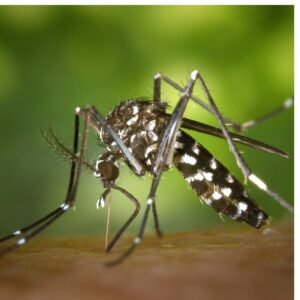6 Ways to Protect Yourself From The Zika Virus (ZIK-V)

The Zika virus is a mosquito-borne virus that is primarily spread by the Aedes mosquito the same mosquito that transmits chikungunya and dengue viruses.. It has caused widespread concern due to its link to severe birth defects, including microcephaly. While the virus is no longer making headlines as it did a few years ago, it is still a concern for people living in areas where the virus is present.
The symptoms of Zika virus can vary from person to person, and some people may not experience any symptoms at all. However, common symptoms of Zika virus include:
- Fever
- Rash
- Joint pain
- Conjunctivitis (red eyes)
- Muscle pain
- Headache
- Fatigue
Symptoms of Zika virus usually appear within 3 to 14 days after a person is bitten by an infected mosquito. Most people who contract the virus will recover without any serious complications. However, there is a concern that pregnant women who contract Zika virus may be at risk of giving birth to babies with severe birth defects, including microcephaly.
It’s important to note that not all cases of Zika virus infection may be symptomatic, so it’s possible to be infected with the virus without experiencing any symptoms. If you have traveled to an area where Zika virus is present, or if you have been exposed to someone with the virus, it’s important to seek medical advice even if you are not experiencing any symptoms.
Here are six ways to protect yourself from the Zika virus:
- Wear protective clothing: If you live in or are traveling to an area where Zika is present, wear long-sleeved shirts and long pants. This can help protect your skin from mosquito bites. You can also wear clothes that have been treated with permethrin, a type of insect repellent that can help prevent mosquito bites.
- Use insect repellent: Use an insect repellent that contains DEET, picaridin, IR3535, or oil of lemon eucalyptus. These ingredients are proven to be effective at repelling mosquitoes. Be sure to follow the instructions on the label and reapply as directed.
- Use mosquito nets: If you’re sleeping outdoors or in an area where mosquitoes are present, use a mosquito net to help protect yourself from bites.
- Eliminate standing water: The Aedes mosquito breeds in standing water, so eliminate any sources of standing water around your home or property. This includes emptying flower pots, bird baths, and any other containers that collect water.
- Practice safe sex: The Zika virus can also be transmitted through sexual contact. If you or your partner has recently traveled to an area where Zika is present, use a barrier method of contraception (such as condoms) to prevent the transmission of the virus.
- Stay informed: Stay up-to-date on the latest information about Zika. The Centers for Disease Control and Prevention (CDC) and the World Health Organization (WHO) are great resources for the latest news and guidance.
There is currently no specific treatment for Zika virus infection. Treatment is usually focused on relieving symptoms and providing supportive care. Here are some steps you can take to help alleviate the symptoms of Zika virus:
- Get plenty of rest: Resting can help your body fight off the infection and can also help alleviate symptoms like fatigue.
- Stay hydrated: Drinking plenty of fluids can help prevent dehydration and can also help alleviate symptoms like fever and muscle pain.
- Take acetaminophen: Acetaminophen (such as Tylenol) can help relieve fever and pain associated with Zika virus. However, it’s important to avoid non-steroidal anti-inflammatory drugs (NSAIDs) like aspirin, ibuprofen, and naproxen, as they can increase the risk of bleeding in people with dengue fever, which can be a complication of Zika virus infection.
- Use insect repellent: While it won’t treat the symptoms of Zika virus, using insect repellent can help prevent further mosquito bites and can help prevent the spread of the virus.
- Aspirin and other non-steroidal anti-inflammatory drugs (NSAIDs), like ibuprofen and naproxen, should be avoided until dengue can be ruled out to reduce the risk of hemorrhage. If you are taking medicine for another medical condition, talk to your healthcare provider before taking additional medication.
If you are pregnant and you suspect that you have been infected with Zika virus, it’s important to seek medical attention right away. Your doctor may recommend additional testing and monitoring to ensure the health of your baby.
While there is no specific treatment for Zika virus infection, you can take steps to alleviate the symptoms and help your body fight off the infection. Be sure to stay hydrated, get plenty of rest, and take acetaminophen to help relieve fever and pain. If you are pregnant and suspect that you have been infected with Zika virus, seek medical attention right away.
Protecting yourself from the Zika virus is essential if you live in or are traveling to an area where the virus is present. By taking these steps, you can reduce your risk of contracting the virus and protect yourself and your family from this potentially serious illness.

Comments